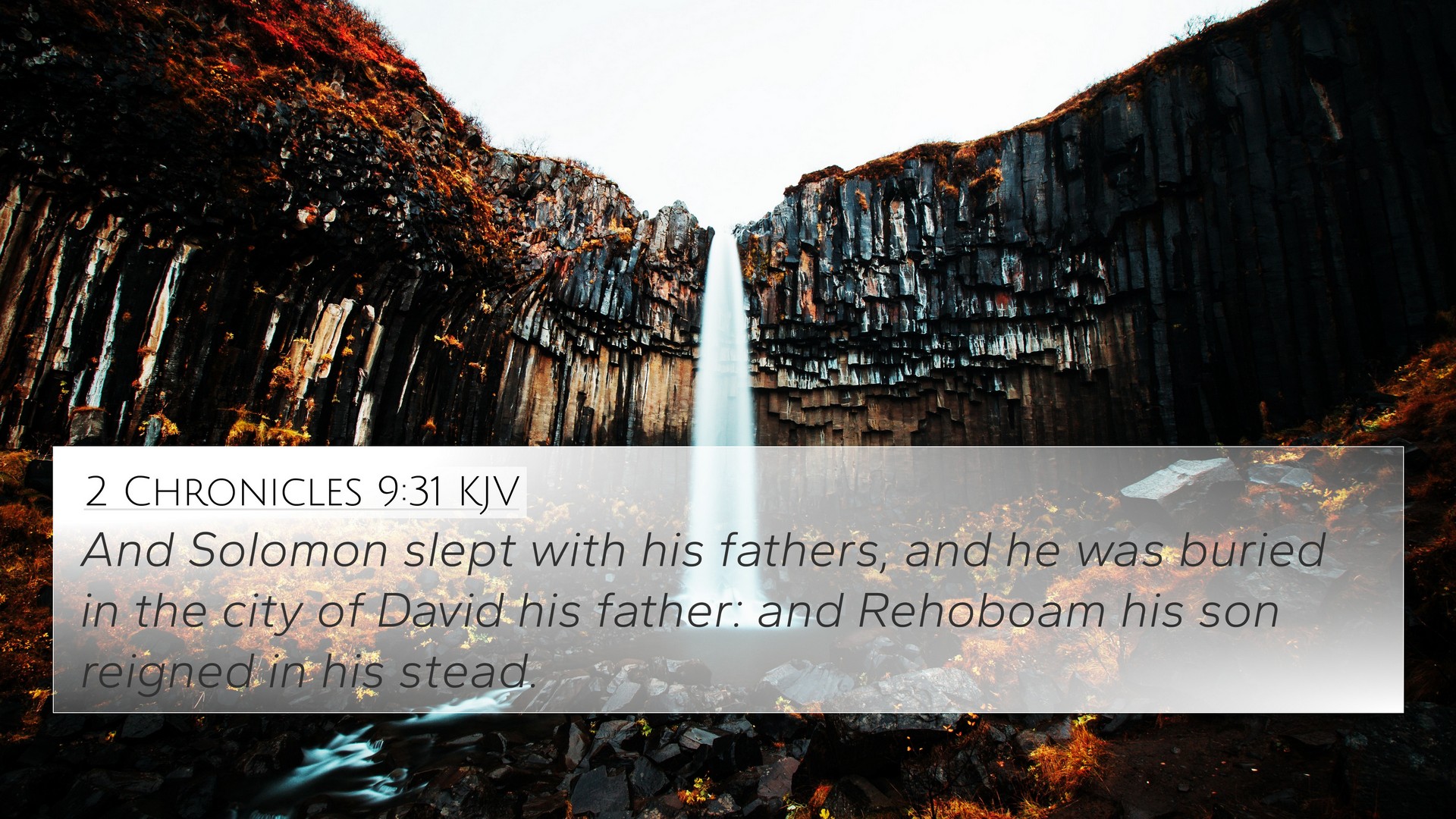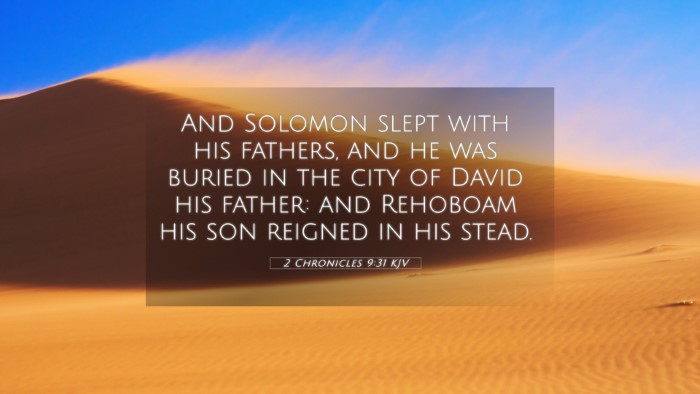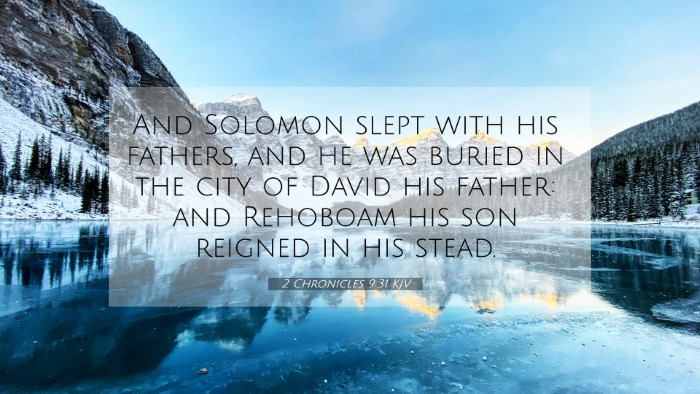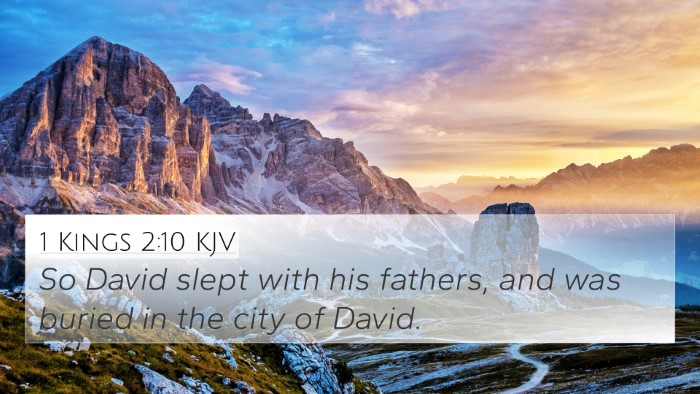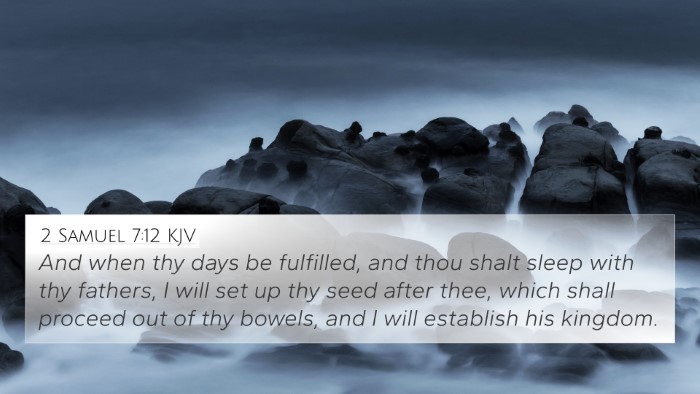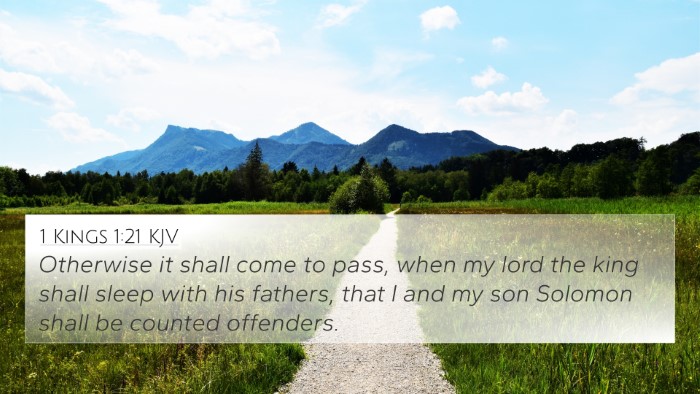Understanding 2 Chronicles 9:31
Verse: "And Solomon slept with his fathers, and was buried in the city of David: and Rehoboam his son reigned in his stead." (2 Chronicles 9:31)
Summary: This verse marks the conclusion of Solomon's reign as King of Israel and transitions to his son Rehoboam's ascendancy. It emphasizes the continuity of the Davidic line, a crucial theme throughout the Chronicles.
Commentary Insights
-
Matthew Henry's Commentary
Matthew Henry notes the significance of Solomon's death and burial, pointing out that he "slept with his fathers," which represents a peaceful end to his reign and life. It also highlights God's faithfulness in keeping His promises to David concerning his lineage and the succession of the throne.
-
Albert Barnes' Commentary
Albert Barnes elaborates on the transition of power to Rehoboam. He discusses how Rehoboam's reign is critical to the narrative of the divided kingdom, emphasizing the importance of wisdom and governance, which Solomon displayed during his life but struggled with in terms of Rehoboam's future decisions.
-
Adam Clarke's Commentary
Adam Clarke provides historical context regarding the city of David, where Solomon was buried. He contextualizes the significance of Solomon's achievements and his mixed legacy, urging readers to consider both his wisdom and errors as lessons for future generations.
Thematic Connections
The verse not only highlights the end of Solomon’s reign but also sets the stage for the dramatic changes that will follow in Israel. This transition represents a critical thematic connection throughout the Old Testament concerning leadership, the consequences of choices made by rulers, and the enduring consequences on the people.
Bible Verse Cross-References
When exploring the connections between scriptures, several cross-references can be identified that enhance the understanding of 2 Chronicles 9:31:
- 1 Kings 2:10-12: This verse describes the death of Solomon and cements the narrative of his succession.
- 1 Kings 11:43: Discusses Solomon's death, reinforcing the portrayal of his life and reign.
- 2 Samuel 7:12-13: God’s promise to David that his lineage would continue, vital for understanding the significance of Rehoboam’s reign.
- 2 Chronicles 10:1: Introduces Rehoboam's ascension, crucial for understanding the division of the kingdom.
- Proverbs 4:7: Advocates the value of wisdom, which contrasts with Rehoboam’s decisions following Solomon's reign.
- Ecclesiastes 1:12-14: Reflects on the deeper themes of legacy and the transient nature of life, relevant to Solomon's reign.
- Jeremiah 22:30: Highlights the line of David, relevant to understanding Rehoboam's legitimacy.
- Matthew 1:12-16: Connects the lineage of David to the New Testament, showing the continuity and its ultimate fulfillment in Christ.
- Romans 15:4: Emphasizes the importance of the scriptures for understanding God’s plan, relating back to the narratives found in Chronicles.
- Hebrews 7:14: Comments on Christ's lineage from Judah, which stems from the line established from David through Rehoboam.
Inter-Biblical Dialogue
This verse prompts readers to engage in inter-Biblical dialogue, allowing for a comparative analysis of the Old and New Testament themes. It invites contemplation on leadership's impact, divine promises, and the spiritual lessons inhered within historical narratives.
Tools for Bible Cross-Referencing
To further explore the connections and implications of 2 Chronicles 9:31, readers can utilize various tools for Bible cross-referencing:
- Bible concordance
- Bible cross-reference guide
- Comprehensive Bible cross-reference materials
- Cross-reference Bible study methods
- Tools for Bible cross-referencing and thematic research
How to Use Bible Cross-References
Understanding how to use Bible cross-references can deepen one’s study and comprehension of biblical texts:
- Identify connections between Bible verses by examining thematic elements.
- Explore links between the Prophets and Apostolic teachings for contextual clarity.
- Utilize Bible references for sermon preparation and personal growth.
Conclusion
The verse 2 Chronicles 9:31 serves as a powerful reminder of God’s faithfulness, the importance of wise leadership, and the relevance of understanding our spiritual legacy. Through cross-referencing and thematic connections, readers can gain profound insights and further their knowledge of scripture.
